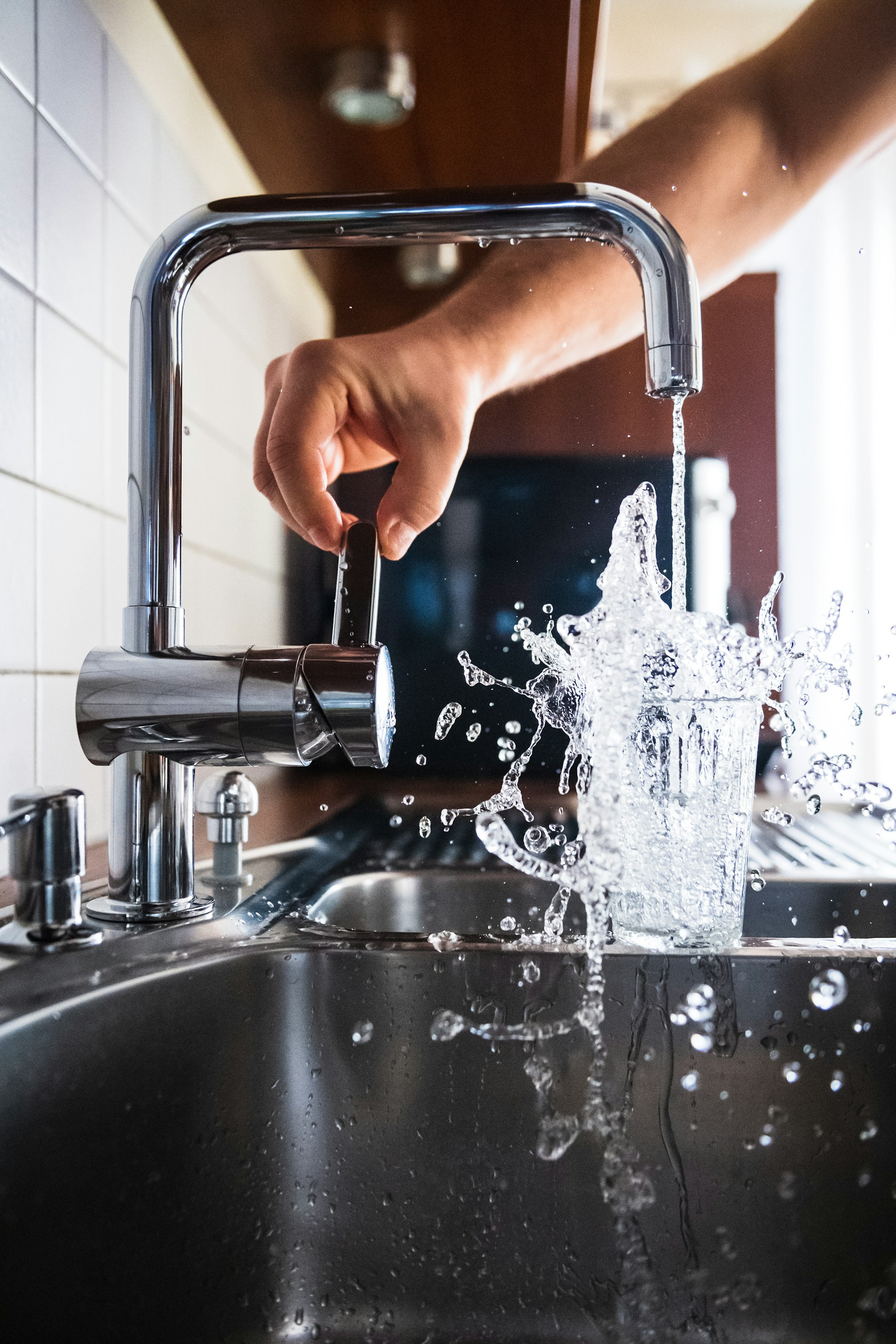Is Dehydration Ruining Your Sleep?
Does dehydration affect sleep? What causes dehydration at night? Here's what the research says about being even mildly dehydrated when you crawl into bed. (Spoiler alert: It can affect your natural circadian rhythm and cause sleep disruptions.)

Reviewed by Jenna Gress Smith, PhD, sleep specialist.
Your body needs water to live. Every cell, tissue and organ requires water to function properly, which is why adequate daily hydration is essential for good health.
When you’re dehydrated you’ll feel logy, sluggish, fatigued, and headache-prone. If you’re thinking that sounds remarkably like how you feel when you’re sleep deprived, you are correct... and the correlation doesn’t end there.
Though we usually think about staying hydrated (if we think about it at all) during hot summer days or when we're working out, new research is exploring the connection between proper hydration and high-quality sleep. Research has shown that inadequate hydration can in fact have a negative impact on a good night’s rest.
Being even mildly dehydrated when you crawl into bed can impact your natural circadian rhythm, causing sleep disruptions followed by sleepiness the following day. And while dehydration may create barriers to sleep, insufficient sleep may also increase your chances of being dehydrated. It’s a two-way street. Who knew?!
Let’s look both ways at the hydration-sleep connection.
How dehydration can hurt your sleep
Even though your body is mostly still while you sleep, physiologically it’s very active. During REM sleep, your brain consolidates memories and learning; deep sleep is when your body restores chemical balances, recovers, and heals. Because water is essential for every one of our body’s functions, being dehydrated when you flip off the lights can affect the multiple complex processes by which your body repairs itself during the night.
There are several other ways dehydration can disrupt healthy, restful sleep:
- Muscle cramping Nocturnal leg cramps of the calf or foot muscles, which can wake you up in the middle of the night, are often a symptom of dehydration. Dehydration can also trigger muscle spasms, making it hard to fall asleep or potentially waking you up. (Muscle mass is 76 percent water, according to a study review published in August 2019 in Nutrients.)
- Headaches Headaches and migraines can complicate falling asleep and staying asleep. Dehydration headaches may be caused by the brain temporarily contracting or shrinking due to fluid loss and electrolyte imbalance. This action of the brain pulling away from the skull can potentially cause the pain.
- Early morning thirst Being thirsty can wake you up in the middle of the night, or too early in the morning.
- Dry mouth A dry mouth and nasal passageways can cause discomfort and aggravate sleep. Occasionally it can cause snoring, even if you’re not typically a snorer, waking you (not to mention your partner) up at night.

Dehydration can also affect melatonin — a sleep hormone that plays a key role in regulating your natural sleep cycle. Chronic dehydration reduces the presence of amino acids in your body that produce melatonin. Without enough melatonin, you may not get sleepy at night, and it may take longer to fall asleep.
Melatonin also plays an indirect role in the metabolism of water and electrolytes. If you don’t have enough melatonin because you’re dehydrated, your sleep may suffer even more. Even being slightly dehydrated can lead to lighter sleep.
How poor sleep can worsen dehydration
Though sleep experts have a pretty good handle on how dehydration can upend a restful night, it’s only recently that scientists have begun exploring how a lack of sleep may contribute to dehydration.
A 2018 research study out of Pennsylvania State University shed some light on the subject. The study, which looked at data from more than 20,000 healthy young adults from the U.S. and China, showed that those who self-reported sleeping 6 hours or less per night had significantly higher rates of dehydration (as measured by urine samples) than those who regularly logged 8 hours or more.
In both populations, those who reported sleeping 6 or fewer hours had up to a 59% higher risk of dehydration compared with those who slept 7 to 8 hours on a regular basis.
The researchers speculated that their findings could reflect the nightly rhythm of a hormone called vasopressin.: Here’s their thinking:
During sleep, we don’t take in any fluid to make up for what’s lost through insensible water loss, which refers to normal respiration and other bodily processes. So our circadian rhythm kicks in to manage a balanced level of hydration. In the latter part of sleep, circadian signals tell the body to produce an antidiuretic hormone called vasopressin, which promotes water retention. If sleep is interrupted or cut short, this natural process may also be disrupted, interfering with the hormonal signals. As a result, sleep deprivation may directly contribute to dehydration.
Commenting on the findings, the lead author noted, “If you are only getting 6 hours of sleep a night, it can affect your hydration status.” The findings, published online by the journal Sleep, suggest that the symptoms we experience the next day and think are from inadequate sleep—fatigue, fuzzy thinking, and morning headaches—may in fact be due to dehydration.
Better hydration = better sleep (and vice-versa)
It happens. You realize the day has slipped away with barely a sip of water. In those cases, you don’t want to chug a day’s worth of fluid right before bed if you don’t want to be up all night peeing. Disrupted sleep can take a toll on your energy, performance, and mood the next day — and who needs that?

Here are a few tips to stay properly hydrated ... and get your best rest.
- Drink up first thing in the morning. Some sleep experts recommend starting the day with 20 oz. of water first thing in the a.m. to kickstart your hydration. We naturally lose fluids and electrolytes overnight through normal respiration—more if you’re a hot sleeper, have night sweats, or obstructive sleep apnea (OSA). You’ll also lose more fluid if you’ve worked out close to bedtime without re-hydrating or have had a few nightcaps before going to bed.
- Sip fluids regularly throughout the day. Schedule reminders if you need to. The old rule of thumb used to be 8 glasses of water per day, but new National Academy of Medicine guidelines suggest that men drink around 125 ounces (about 15 cups) and women, 91 ounces (about 11 cups). That may seem like a lot, but it also includes water from foods you consume. Plus, the amount you need depends on your weight, height, level of exercise, and diet, so talk with your doctor to figure out the right amount for you.
- Keep a reusable water bottle close by. For convenience, and also to monitor your water during the day. (If you have a 20-oz water bottle, for instance, it’s easy to do the math and keep track of your daily fluid intake.)
- Make water your main beverage. Limit sugary drinks like soda or juice as well as caffeine and alcohol, which are diuretics and can interfere with your sleep cycle.
- Include lots of fruits and vegetables in your diet. Many have a high water content, which counts toward your hydration goals, and are also a good source of electrolytes like potassium and sodium, which are important for properly hydrating your body.
- Keep your cool. If your bedroom is too warm or you tend to sleep hot, you’re more likely to wake up dehydrated. According to the Sleep Foundation, the ideal bedroom temperature for most people is around 65 degrees (or a range between 60 to 67 degrees) Fahrenheit.
According to the Penn State study’s lead author, their research suggests that “if you feel bad or tired” — whether it’s because you didn’t get enough sleep the previous night, or you didn’t hydrate well the previous day— the antidote is the same: "Drink extra water!"
